Get a best value annual BarefootRoar subscription to keep up to date with innovative new digital content throughout 2024
Worldwide Roar is now BAREFOOT MAN! Learn more
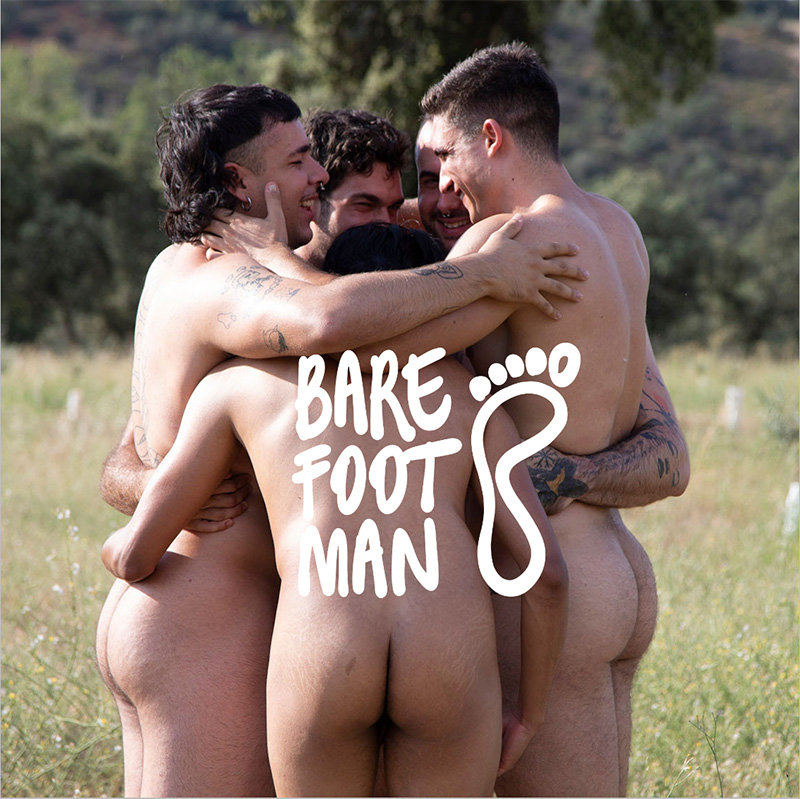
Stay up to date with our latest news, competitions and offers. We look forward to staying in touch.
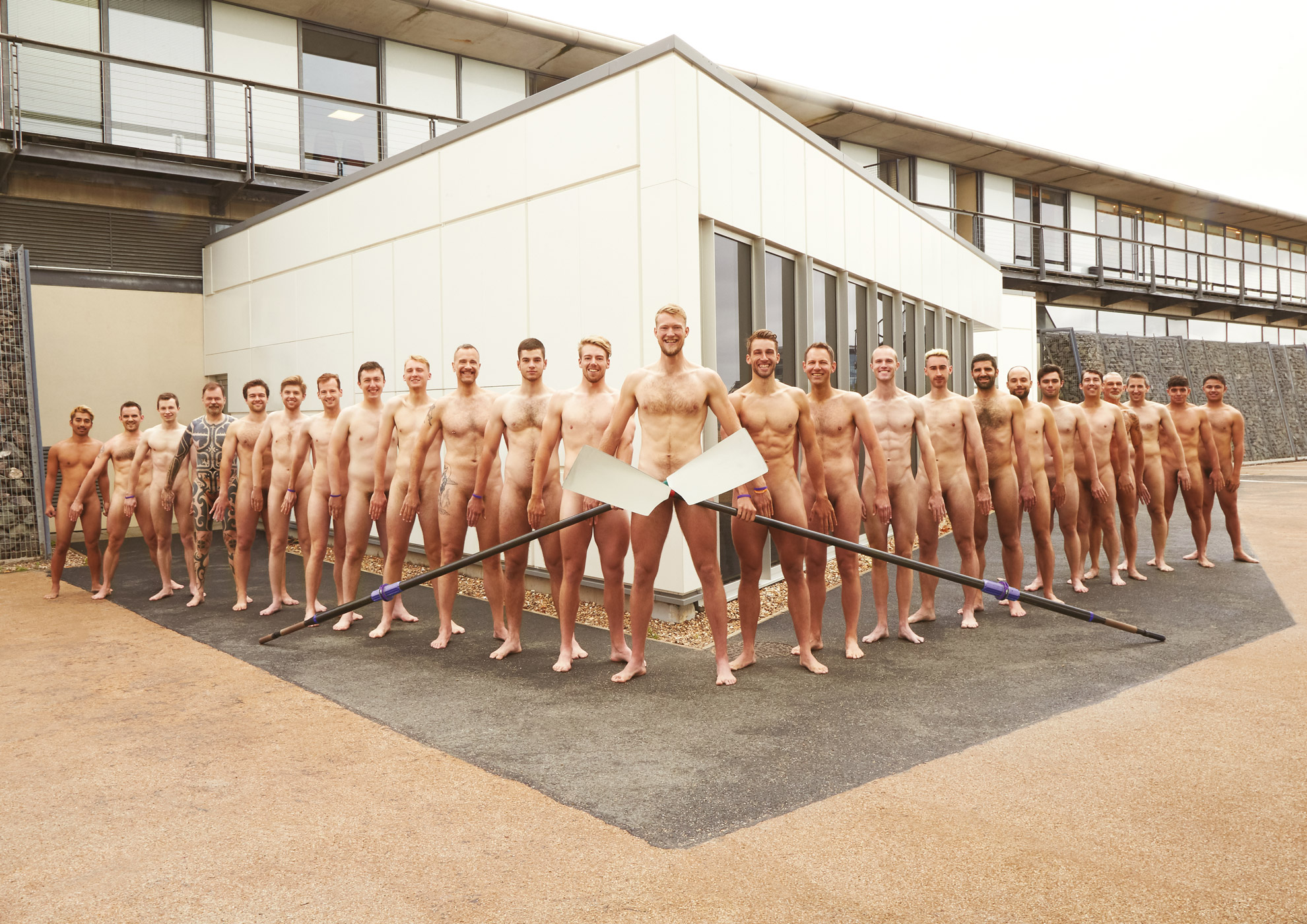
A Story by Chat GPT4
In 2040, the Olympic Committee was facing a crisis. Viewership had plummeted, and public interest had waned. To revive the spirit and essence of the Games, historians proposed looking to the past—to the very beginnings of the Olympics in ancient Greece.
It was there, in Olympia in 776 BCE, that the first recorded Olympic Games took place, with athletes competing in the nude. Nudity was an homage to the gods and a celebration of the human body, in all its natural glory and power.
After months of debates, the Committee made a bold decision: the upcoming Summer Games would offer events where athletes could, if they chose, compete as the ancient Olympians did—in the nude.
This choice was made optional to respect the diverse cultures and beliefs of athletes around the world. The aim was not to sexualize the competitors, but rather to return to the roots of the Games and celebrate the human form and spirit.
As news broke, the world buzzed with anticipation and controversy. There were those who praised the decision, viewing it as a refreshing celebration of body positivity and a return to the true spirit of the games. Detractors, on the other hand, called it a gimmick, a desperate bid for attention.
When the Games began, the world watched with bated breath. Surprisingly, many athletes embraced the tradition. There was something primal, liberating, and powerful about competing in their most natural state, devoid of the trappings of modern sportswear.
In the racing events, runners sprinted, their muscles rippling, embodying the very essence of human motion. In gymnastics, the pure artistry and athleticism of the human body was on full display, unencumbered by clothing. Wrestlers grappled, echoing the traditions of millennia past.
Yet, it wasn’t just about the spectacle of the human body. The return of nudity to the Olympic Games shifted the narrative. Commentary focused less on what athletes were (or were not) wearing, and more on their stories, their dedication, and their talents.
There was a renewed sense of camaraderie among athletes. Competing in the nude was a great equalizer; there were no logos, no brand endorsements—just pure skill. Many spoke of feeling more connected to their fellow Olympians, sharing this uniquely vulnerable and powerful experience.
The world watched, fascinated, as records were broken and new champions crowned. As the Games concluded, it was clear that the decision to reintroduce nudity, even if only as an option, had shifted the global conversation about body positivity, authenticity, and the essence of the Olympics.
Not all subsequent Olympic Games continued the tradition, but the impact was undeniable. The 2040 Olympics served as a reminder of the raw power, beauty, and spirit of humanity. It was a celebration of our shared history, and a nod to the ancient athletes who, beneath the sun of Olympia, competed with passion, dignity, and pride.
Our posts on social media are censored to conform to the rules set by Instagram. Back in the very early days of our project, you only ever got to see bottoms and a little bit of bush, which was enough to get us into trouble on Instagram, but that’s another story.
When we started making documentary films of our shoots, we quickly realised it was impossible to hide everything, and gradually we stopped trying. Since then we have featured the penis increasingly prominently in our content. It has become one of the cornerstones of our commitment to authenticity, vulnerability and changing how we look at men. It has undoubtedly been challenging for a lot of guys in the project, but it has also become one of our most important learning experiences.
The penis has been symbolically connected to notions of masculinity, dominance, and aggression throughout history. At Barefoot Man, we want to challenge those associations by inviting men to present their bodies in a way that is respectful, authentic and with the consent of everyone involved. That has meant that while we do show penises we do not show erections.
As soon as a man is erect, it can appear as an assertion of power or a threat of violence to come. Images can be just as aggressive, unwelcome or manipulative as reality. Unsolicited dick pics are generally unwelcome, and most of the erections we see online probably belong to people we will never meet, and who may not find us sexually exciting in real life.
We want to show men’s bodies in a way that they are rarely seen: on the terms of the viewer, not the subject, and without creating an illusion of sexual availability that may only exacerbate a misplaced sense of sexual entitlement.
History in a Flash
The idea of the penis as a symbol of aggression is definitely not new. In various cultures throughout history, phallic symbols have been used to represent power. For instance, in ancient Egypt, obelisks were erected as monuments to the god Atum, symbolizing the penis and its creative force. Similarly, in ancient Greece, the phallus was a symbol of fertility and strength, often used in religious and cultural rituals.
In some cultures, the act of exposing one’s penis was seen as an act of dominance and aggression. In ancient Rome, the practice of “infamia” involved the public exposure of one’s genitals as a form of humiliation and aggression against slaves and prisoners. In Native American cultures, the “scalping” of enemies was sometimes associated with genital mutilation as a display of dominance.
Since the invention of photography and the growth of popular entertainment, we have got very used to looking at women’s bodies whenever we want – on a stage, on a page, on a screen. Men’s bodies, and particularly their penises, were for a long time less easy to see as a matter of choice, at least outside the ghetto of gay erotica.
The Dick Today
In the digital age, it is definitely easier to see a lot of penises, but it makes it more important than ever that we create rules around how men show them and how everyone sees them. There are plenty of men out there arguing that masculinity and male aggression are tied to sexual virility.
These connections are being used to perpetuate harmful stereotypes. The term “toxic masculinity” is shorthand for a whole range of cultural behaviours and the harm caused by rigid gender roles and expectations placed on men. It is not our favourite term as it conflates men with masculinity and life is not that simple. Not all men are Andrew Tate, but too many men buy into being dominant, aggressive, and sexually assertive. Barefoot Man is about creating alternative masculinities so that men can dissociate themselves from this toxicity.
Consent and respect are paramount when it comes to sexual interactions. The idea of using one’s penis as a weapon of aggression is not only morally wrong but also illegal. Consent and communication are essential for healthy sexual relationships.
Rather than seeing the penis as a weapon of aggression, we need to address the underlying power dynamics and social issues that contribute to aggressive behaviours. These issues can include gender inequality, misogyny, and societal pressures. At a time when we seem to be polarised in many ways, it has never been more important to emphasise the importance of consent, respect, and education in fostering healthy sexual relationships and challenging harmful stereotypes.
Let’s rehabilitate the penis. Let’s put it at the heart of promoting healthier masculinities for young and old alike. By considering and offering the penis as a peace symbol, men can move away from simplistic notions of masculinity that perpetuate aggression. We believe it will help everyone to embrace a more nuanced understanding of human sexuality and gender dynamics.
#MentalHealthAwarenessWeek2021 has been about the importance of nature to our wellbeing. It was a very appropriate choice: many of us have been locked up, away from nature and away from a whole range of activities that are a natural part of our wellbeing.
Some men spend their whole lives that way, locked behind doors and barriers that keep the world out and their thoughts in. There is a great film from The Representation Project called The Mask You Live In (http://therepresentationproject.org/film/the-mask-you-live-in-film/see-the-film/). The film explores this problem in a vivid, accessible and compelling way. Do check it out!
The Worldwide Roar supports men to remove the barriers of masculinity for their own wellbeing, and to become allies in the wellbeing of others.
These images are from our biggest ever shoot, which we held not long after Manifesto had gone to press. It featured our first transman, more men of colour, our first man with tattoos, our first men over forty, and an almost even balance between men who identified as straight and men who identified as LGBT. There were senior athletes from Olympic level rowing, alongside LGBT members of an inclusive rowing team, some of our original heroes from the boat club days and representatives from a dozen other sports, including pole dancing!
All these men stripped naked and threw purple powder over each other. the idea came from calendar star Amir. We were sitting in a brainstorming meeting one day, discussing plans for our 2020 cover, and Amir mentioned seeing people in his friend’s Hindi community using pigment during Holi, the festival of colours. Holi is the most vibrant of all Hindu festivals, and a celebration of the triumph of good over evil. We loved it immediately.
As ever, purple was our colour of choice – and we think we’re in good company! In Alice Walker’s seminal novel, The Color Purple, one character says, “I think it pisses God off if you walk by the color purple in a field somewhere and don’t notice it.” In the same way, we want men to be mindful of their relationship with their masculinity, and we want everyone to stop and feel the joy that this project and its message bring to both our participants and our supporters.
If these blogs speak to you, we’d love you to join the Roar – as a participant, a sponsor, a donor, a subscriber or an advocate on social media. Whatever you feel you can contribute to the Roar, this is an opportunity for all of us to help each other.
The Worldwide Roar is here for you. Take a fresh look at life, and take a fresh look at men!
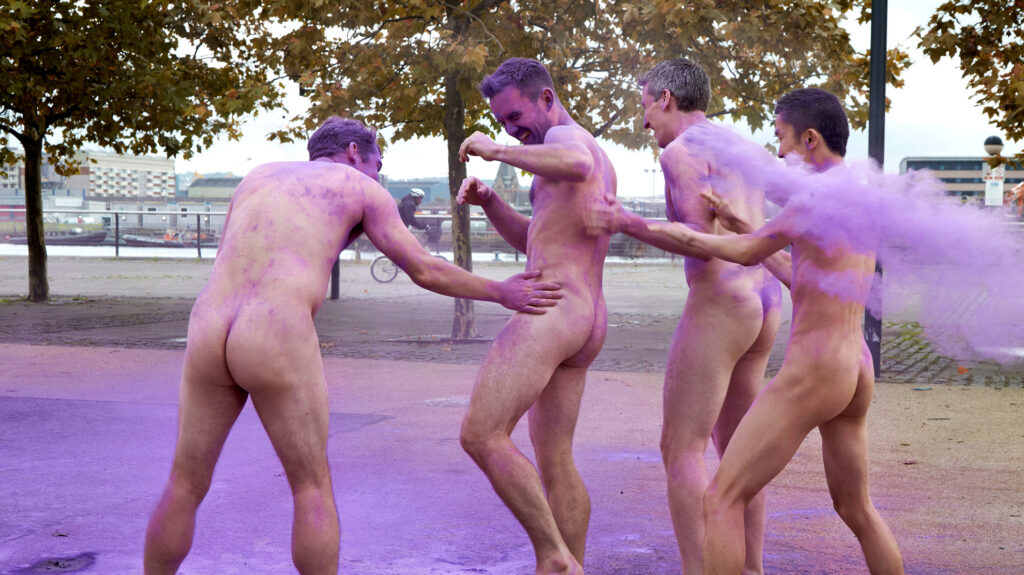
https://www.mentalhealth.org.uk/campaigns/mental-health-awareness-week
https://theskillcollective.com/blog/5-mens-health-resources
https://www.healthdirect.gov.au/mens-mental-health
Today we bring you the last of the five principles for healthier masculinity and better male mental health that we explored through art in our book, Manifesto.
It is perhaps the most important of all, and it’s all about help: understanding there is no shame in needing help, recognising when you might need some, reaching out to find the help you need, and then being open to receiving it.
We know it’s not always easy! By the time we did this shoot, we had been the Warwick Rowers for ten years. It became more and more of a challenge as interest in our project kept on growing. By 2019, we finally understood that our little boathouse could no longer contain us. There was more to be done than we could manage, and more to be said than one small sports club could hope to know, let alone say. We knew that we could no longer do this project justice by ourselves.
We thought about how much all of us on each side of the camera had learned over the years – about ourselves, about the world around us, and about the difference that any of us can make if we try.
The biggest thing we learned was that everyone can make a difference if they try, and trying feels good.
We thought about the many other sportsmen who could benefit from going on this extraordinary journey that we had taken over many years – one that we believe has made us healthier.
We recognised that our message could grow stronger with the help of men who had been on different journeys to our own. We knew that our voice would have more power as one among many voices – the voices of men from different sports, cultures, sexualities and birth genders. The voice of BIPOC men, of LGBTQI men, of men who had grown up in worlds far away from our own.
We sent up a flare to ask for help, because we know how much this project has meant to people all over the world already, and how much it could mean to so many more.
That help has already begun to arrive, from national and international sporting bodies, broadcast sports media, community sports organisations and from the many individual sportsmen who are joining us, naked.
Now we ask for your help, too – as a participant, a sponsor, a donor, a subscriber or an advocate on social media. Whatever you feel you can contribute to the Roar, this is an opportunity for all of us to help each other.
The Worldwide Roar is here for you. Take a fresh look at men!
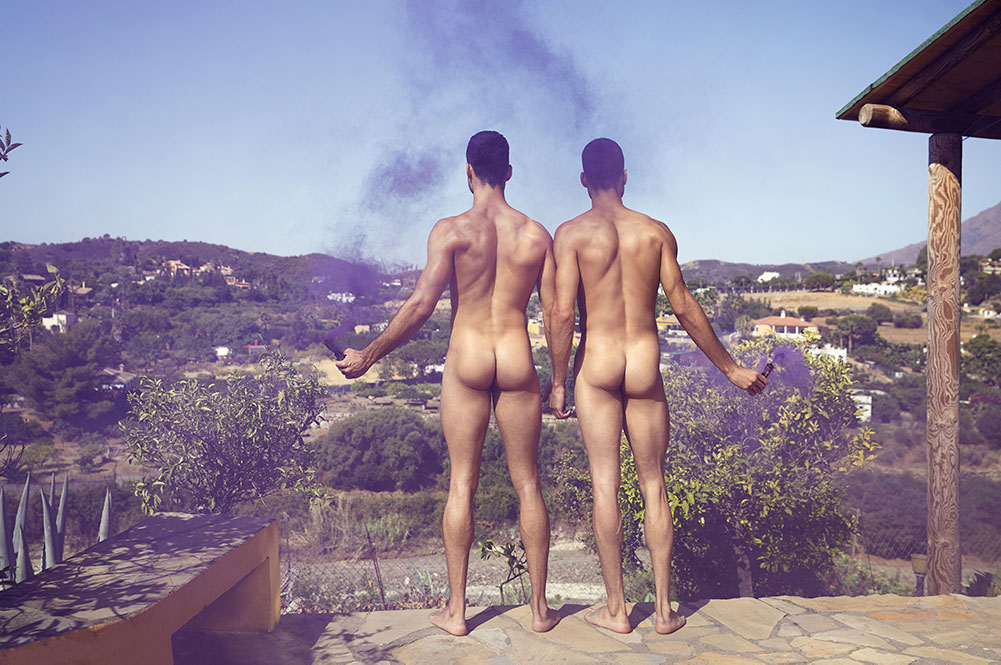
https://www.mentalhealth.org.uk/campaigns/mental-health-awareness-week
https://theskillcollective.com/blog/5-mens-health-resources
https://www.healthdirect.gov.au/mens-mental-health
We have always presented male nudity as a gesture of respect by men living in a culture that has for too long privileged the heterosexual male gaze. During 2017, we witnessed a widespread conversation about the disempowerment and objectification of women. There was a recognition of the need for more equitable rules around male and female power, and particularly male and female bodies.
Yves Klein was a French painter who, like Jackson Pollock, experimented with alternative ways to apply paint. In his late 1950s series, Anthropometry, he used naked female models as “living brushes”. We decided to revisit Klein’s work using our bodies as men. We wanted to echo Klein’s emphasis on the act of creation, but also to celebrate the breakthroughs taking place to challenge patriarchal assumptions.
To do this, we brought an enormous raw canvas measuring nine metres by four metres to a remote location in Southern Spain, along with a lot of paint. We created a performance in which we put the paint on each other, and we put our bodies on the canvas, because we believe that change happens faster when we work together and commit our whole selves to reaching our goals.
Working as a team, body and soul. That is what we do in our sport, and it is what we do as men who get naked to support change.
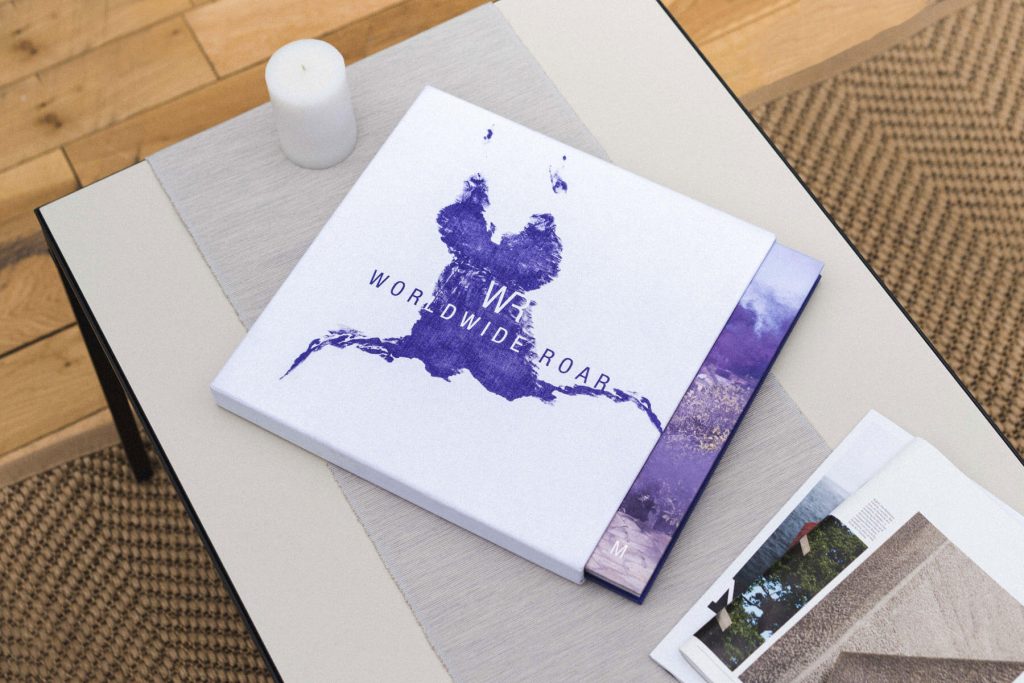
https://www.mentalhealth.org.uk/campaigns/mental-health-awareness-week
https://theskillcollective.com/blog/5-mens-health-resources
https://www.healthdirect.gov.au/mens-mental-health
It is always good to talk. Communication is at the heart of our own mental health as well as our relationships with others, but it is not always easy to share how we feel or say what we mean.
Graffiti can be a manifestation of this; it is often a way for people without a voice to say things that cannot be said, anonymously, outside the rules.
Men’s voices might be the loudest in the room, and the ones that get listened to by other, similar men, but that doesn’t mean that men are good communicators. We struggle with talking about emotions, we find it hard to be clear and direct (though that doesn’t mean we don’t shouty and aggressive!), we aren’t always good at listening, we dodge difficult questions and we struggle to separate communication from competition (ever noticed how all-male communication is often about status and power?).
So after the free form paint spraying of Jackson Pollock and the handprints of intimacy, in 2016 we brought the brush back, because words are useful. With words at this shoot on a nude beach in Spain, we were able to communicate our love for our cause and our commitment to using words as tools for sharing by putting graffiti on each other’s bodies.
We chose to do it in bright sunshine on a public beach, because there is no shame in love, and no shame in sharing how you feel.
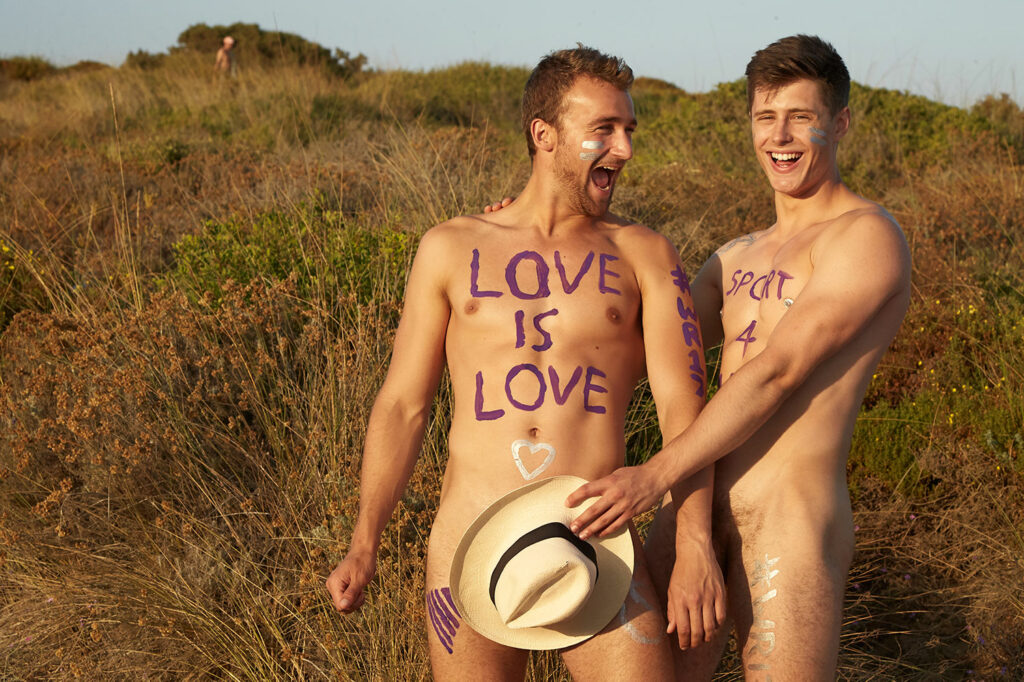
https://www.mentalhealth.org.uk/campaigns/mental-health-awareness-week
https://theskillcollective.com/blog/5-mens-health-resources
https://www.healthdirect.gov.au/mens-mental-health
For our third blog post for Mental Health Awareness Week 2021, we go back to 2015 and our famously cheeky ‘handprints’ shoot! We know it’s a crowd pleaser, but this shoot is also very much about a crucial aspect of how men too often neglect their own wellbeing and the wellbeing of others. It’s about intimacy and connection.
The world is changing fast, and how we interact with each other is possibly changing faster than anything else. Many of us now give more attention to screens and keyboards than to each other. Of course, that has been particularly true during the pandemic – screens and keyboards have been the only way to reach out and stay in touch.
But even before the pandemic hit us all, there had been a growing loss of human contact, even though we might have felt more connected than ever. Many of us were glued to our screens, not looking at each other, not talking, not touching.
The nudity in the WR project brings our participants a sense of intimacy and physical freedom with other men that has been lacking for many of us. It makes them conscious of that absence of connection. In 2015 this was something we wanted to explore further, and we decided that handprints were the way to do it.
Touching each other with paint helped the rowers in these images to break through barriers that all men learn to put up as boys. It also allowed them to put that their commitment to connection on the record.
Now, as vaccination offers the hope of a return to more physical contact, let’s use this opportunity to make mindful intimacy and ‘real world’ connection a more conscious part of how we care for ourselves and each other.
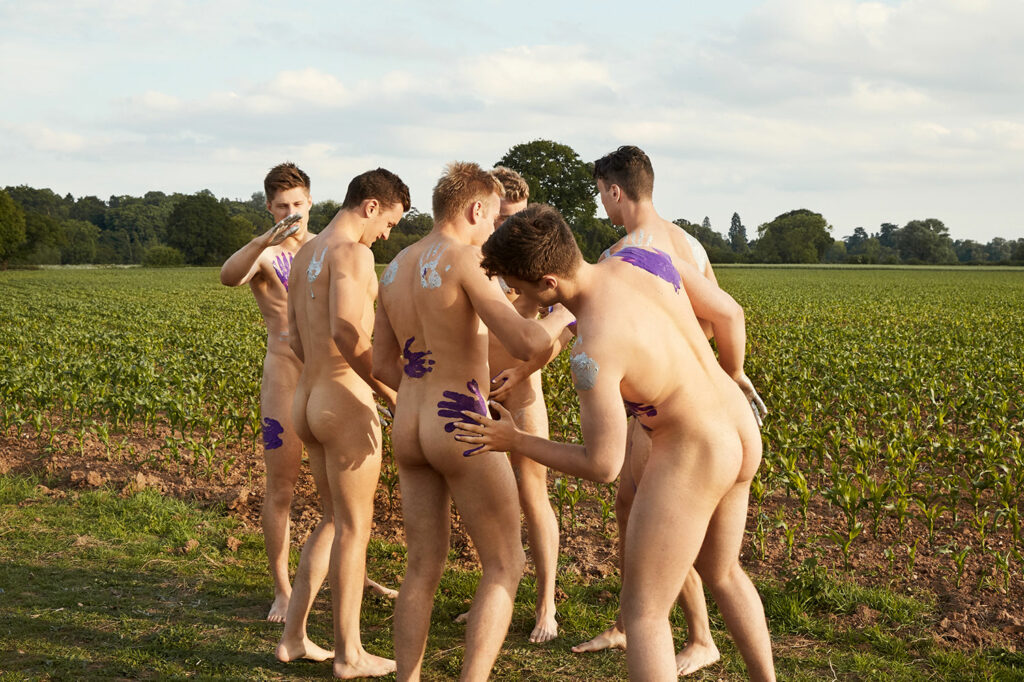
https://www.mentalhealth.org.uk/campaigns/mental-health-awareness-week
https://theskillcollective.com/blog/5-mens-health-resources
https://www.healthdirect.gov.au/mens-mental-health
For the second in our series of blogs for Mental Health Awareness Week 2021, we go back to 2014. It was a big year for us. We had reformatted our calendar and changed our name to Warwick Rowers. We had set up the registered charity Sport Allies to build on our message, and adopted shared new colours of purple and silver for both projects.
Having a bigger canvas and a renewed sense of purpose inspired us to begin paint shots with these two great colours – but the choice was not just an aesthetic one! Silver is often associated with healing and balance, and purple has become the recognised colour of challenging homophobia and transphobia. It seemed like a good start to promoting healthier masculinity.
In the first chapter of our book, Manifesto, we used images from this shoot to make an important point about male mental health: men must consciously consider their identity as men. Are they truly being themselves or are they struggling to live up to outdated rules of masculinity that have been imposed upon them by their parents, their schools, their peers and by the media culture in which we are all immersed?
We had already seen how these rules had been applied to the men in the WR project. In particular, our project’s stance against homophobia led some people to assume that all the men in the images must be LGBT+. Why, after all, would a straight man take his clothes off to challenge homophobia?
Our response was to ask: why wouldn’t he? We felt it was important to challenge these narrow assumptions about who men could be, and when we looked back at our 2014 paint shoot, we realised it was very much about our relationship to rules.
Our inspiration for this shoot came from Jackson Pollock, the American artist who rose to fame in the mid twentieth century. Pollock’s abstract expressionist school of painting replaced conventional brushwork with frenetic splashing and pouring of paint. For us, it is important that Jackson Pollock didn’t start in a void. He looked at the rules, thought about them, worked with them, understood them, and then broke them.
There are so many rules of masculinity that limit men, like: don’t show emotion; never make yourself vulnerable; always put practicality ahead of joy – and many, many more!
We invite all men to become more conscious of the rules they live by, and then feel free to create new ones.
That’s the first of our ‘new principles for healthier masculinity’ and it sets the course for the rest of this week, when we will be bringing you further thoughts we’ve had as a project about what some more of those new principles might be.
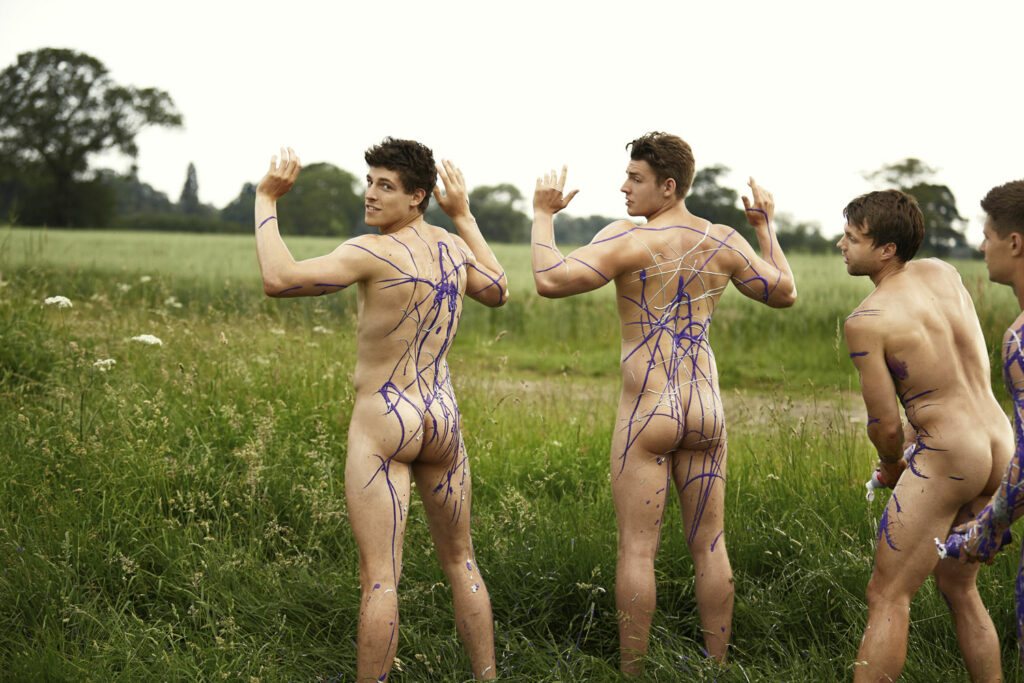
https://www.mentalhealth.org.uk/campaigns/mental-health-awareness-week
https://theskillcollective.com/blog/5-mens-health-resources
https://www.healthdirect.gov.au/mens-mental-health
This week is Mental Health Awareness Week, with a focus on nature. At WR we have embraced nudity in nature as a way of helping men to reconnect with the world around them, so what better time to remind everyone of how central male mental health is to the entire WR project?
Our most recent art photography book, Manifesto, sets out five principles based on everything we have learned as a project – with dazzling images and our customary sense of fun, we hope!
This book and our entire project considers what healthy masculinity looks like, and how better male mental health might make the world a better place for all of us.

By asking an apparently simple question about how we can look at men, WR aims to show how much the heterosexual male gaze continues to dominate our culture – at everyone’s expense.
We want to draw attention to the countless ways that men, particularly heterosexual men, still benefit from unspoken and unconscious privilege in many aspects of life – in the workplace, in politics, in the media, in relationships and, of course, in sport.
We also want to raise awareness that these benefits come at a price. Many men feel unable or unwilling to live up to the ideals of masculinity, resulting in mental health distress that often leads to wider social problems.
By taking a fresh look at men, and supporting men to see themselves differently, too, we hope to raise awareness of how the hidden rules of masculinity impact on every one of us, including the men who appear to benefit the most.
We also want to prove that you can have a truly great time while making a serious point!
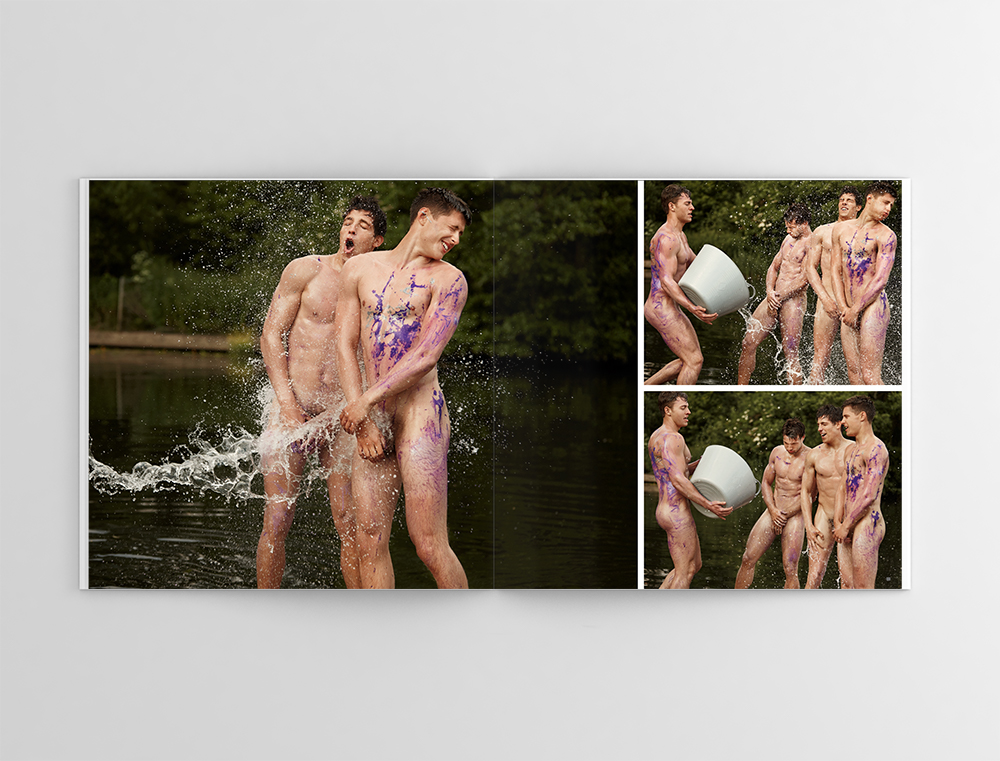
https://www.mentalhealth.org.uk/campaigns/mental-health-awareness-week